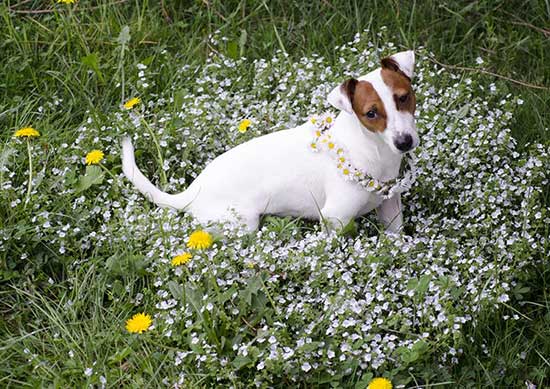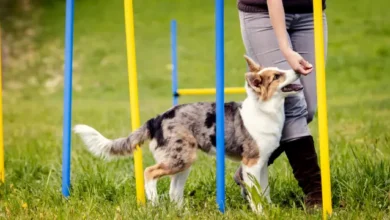
The big question you need to ask yourself when beginning puppy potty training is whether you want your dog to be an inside dog or an outside dog. Either way will require patience, consistency, and some form of positive reinforcement to allow the dog to develop the good habits that will help you to bond with your pet and understand their needs. The typical amount of time for many dogs to learn how to potty train is around four to six months, but it can take up to a year before they are able to tell you in their own way that they need to go.
It is up to the owner to be attentive, patient, and to reward their dog when the canine does well, and use a non-harmful approach for any accidents that might, and likely will occur. Let’s face it, puppies are a lot like children, if they have to go then they will find a place to go. The trick is getting them outside before they do.
Would you punish your child for an accident? Thinking of a puppy as just another child can go a long way towards remaining patient if you are unable to get them outside in time.
Related Post: Learn Some Really Cool Tricks To Teach Your Dog! Step by Step Guideline
A great deal of the responsibility is on your shoulders as the puppy’s owner. You will need to establish a habit of making frequent trips outside to ensure that your puppy has adequate time and opportunity to do their business. Also take into account the size of your puppy, as smaller dogs have smaller bladders and very high metabolisms that push food and liquids through their body that much quicker.
House Training a Puppy
First of all, expect a few setbacks. Few if any dogs will ever be potty trained in record time, meaning that it will take time, patience, and a very consistent schedule that includes rewards if the puppy does well. Just like humans, dogs tend to learn more when they are rewarded for their successes.
Training a puppy takes a good deal of work, so it’s recommended to:
1) Begin training at around 12 to 16 weeks
At this point, the puppy should be able to control their bladder just enough to hold it long enough to get outside. Make sure that you are consistent in reading the signs that your puppy gives you that they need to go, and get them outside as quickly as possible. The signs that your puppy needs to go include:
- whining
- scratching at the door
- pacing, circling
- barking
- sniffing (if you see this it is best to get them outside as quickly as possible, as they are looking for an adequate place to relieve themselves)
2) Keep the puppy confined to a well-defined space
This could mean crate training, in their own room, or even on a leash. This is to keep a closer eye on your puppy in order to know when they need to relieve themselves. As your puppy eventually begins to learn you can give them more freedom and let them roam the house.
3) Maintain a regular feeding schedule.
Feed them in the morning and evening without deviating from the schedule. Eliminate any type of snacks or other meals that might increase their need to relieve themselves.
Related Post: Teach a Dog to Fetch | The Comprehensive Guideline to Teach a Dog to Fetch a Frisbee.
4) Keep the potty schedule consistent.
Take your puppy outside in the morning and after naps so that they can do their business. Also, consider letting them out if you’ve been gone for more than an hour and left them inside. You should also let them outside before you go just to be safe.
5) Take your puppy to the same spot each time they go.
This will eliminate a widespread mess and give them the idea that this is where they go, which is beneficial for the dog and can save a great deal of time. Also remember to remain with your puppy, to begin with, to ensure that they do go. This practice can be relaxed once they are house trained.
6) Always reward your puppy when they do good.
When your puppy manages to do their business outside praise them and offer them a treat of some type, be it a small snack or a nice walk around the neighborhood. This will prompt them to repeat the process in the hope that they will be rewarded.
Setbacks
Accidents will happen with puppies that are a year old or less. These could be the result of:
1) Incomplete house training
2) Change in environment
3) Lack of proper care
If your puppy does have an accident do not hit or yell at them, but make it known that this is not acceptable behavior. Clap your hands loudly to get their attention and then gently guide them outside, but do not strike or yell at them, as this is negative reinforcement that could have unwanted drawbacks. Frightening them is a bad idea as it will force them to perform their business somewhere that you might not expect, and it will negate the bond that needs to occur. Let them know that they need to go outside and continue to train them.
If you continue to have any issues it might be wise to consult with a veterinarian to see what might be wrong.
Bottomline
House training a puppy can be a very challenging experience, but it is an important bonding time for the owner and their puppy as it fosters trust, understanding, and acceptance. By house training your puppy you are including them as a member of your family and household. Not only will it save your home from becoming a mess, it will also serve to create a lasting relationship between you and your puppy that can be beneficial for both of you.
Pet Links & Resources
Teddy Bear Dog
most trainable dogs
silver labs
dog coughing up blood
Best Dog Food Reviews
velcro dog
Healthiest Dog Breeds That Don’t Shed
Why Is My Dog Gagging?
Sacred Animals



